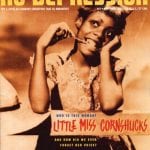Hello Stranger from Issue #45
Well, you got this far, so that’s encouraging.
You will be wondering about the remarkable figure who adorns our cover, then.
Hopefully you will not have jumped to the conclusion that Little Miss Cornshucks is a joke, some kind of post-hip ironic twist. She was anything but. Anything but.
Little Miss Cornshucks was a special singer, singularly influential (see: Ahmet Ertegun, Ruth Baker, Judy Garland), but her significance has long been obscured by the dust of memory and the vagaries of the music industry.
Her work has been out of print since 1962, and remains so today. Music magazines are typically programmed with an eye on record-label release schedules, presuming readers wish to be appraised of the best new music to be heard. We trust that the rest of this issue will more than serve that purpose.
But, as is often the case, we’ve chosen to do things a little bit backwards. There is no grand reissue of Little Miss Cornshucks’ music planned. Rather, we hope contributing editor Barry Mazor’s profile, the result of two years of difficult research, might change that.
Meanwhile, we hope to use some of this newfangled technology to share just a bit of her music with you, online at www.nodepression.net. As we go to press it is not clear what songs we will be allowed to post there, but it is our hope and intent to make available at least a couple of audio glimpses into the music that captivated audiences of her heyday.
Barry didn’t think we’d print this, either — he just happened to talk about the piece when Peter came visiting, by way of explaining the stacks of material cluttering his apartment. Peter mentioned it to me, mostly in passing, and it was largely out of professional curiosity that we asked Barry to send us his draft.
As you will discover, it is an extraordinary story. We are honored to print it.
It is not, perhaps, our usual editorial fare. It signals no shift in our focus, means nothing except that we will go to any length (pun intended, I fear; this piece is now the longest ever to appear in these pages) to discover and report on great music.
We have sought to be particularly careful in designing this cover. Miss Cornshucks’ act was partly comic, partly tragic, and we are well aware that styles and mores have changed in the years since she donned this costume. We wish to honor her, not to caricature her.
Some design footnotes, then. The color scheme has been borrowed from the poster for a 1939 film, Paradise In Harlem, reproduced in 1992’s A Separate Cinema: Fifty Years Of Black Cast Posters. The typeface is called “Splurge,” and came from the brush of legendary signpainter Alf Becker in 1951. The photograph comes from the family of Mildred Jorman, to whom we are most grateful.
As it happens, the production of this issue has coincided with the war in Iraq. I have, naturally, been able to follow events with great interest, but from a tired distance.
It is true that I am not a Christian man, but it is even more true that I believe this one thing as much as I believe any thing: Thou shalt not kill.
It is also true that we liberals — like the generals — inevitably fight the last war. We learned, after Vietnam — for reasons of class, strategy, and basic human kindness not to place our displeasure with political events at the feet of the soldiers called upon to kill and die in the name of our freedoms.
But if those freedoms are worth killing and dying for, they are also worth exercising. And so, in a few days, when I’ve sufficiently recovered from the pleasures of producing this magazine, I’m going to drive across town to one of the record stores whose sales are certainly reported to SoundScan, and there I will buy a copy of what I believe to have been the best album of 2002, the Dixie Chicks’ Home.
I realize this is a very small thing. It’s a start, that’s all.




